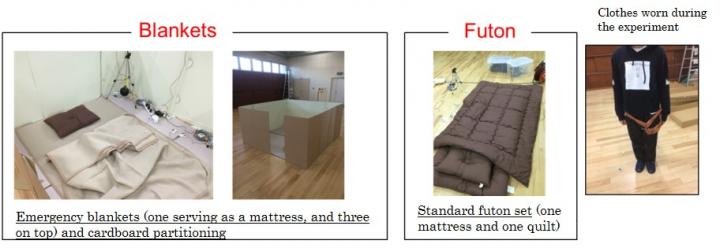Are evacuation shelters too cold in winter?

Credit: COPYRIGHT (C) TOYOHASHI UNIVERSITY OF TECHNOLOGY. ALL RIGHTS RESERVED.
In the Building Environment Laboratory at Toyohashi University of Technology’s Department of Architecture and Civil Engineering, researchers study the effects that indoor environments have on the people that live in these spaces. As part of this research, the laboratory conducted an experiment on the nature of sleep in an evacuation shelter environment. This experiment was performed by creating a mock shelter in the university’s gymnasium with four of the emergency blankets currently stocked in the case of emergency, as well as a standard futon set. The quality of sleep with these two arrangements in the gymnasium were compared to that in subjects’ own beds. The results show that the low temperature (5°C) inside the gymnasium affected subjects’ sleep and body temperature regulation, reducing sleep efficiency by 10% and increasing fatigue.
The last few years have seen an increase in the number of major disasters, with more people being forced to live in shelters and temporary housing. The Japanese Cabinet Office has published guidelines for managing evacuation shelters with reference to efforts in the Sphere Project, but these guidelines provide no detailed instructions regarding power outages or necessary bedding and heating. Evacuation shelters are often large and have an uneven distribution of heat inside them. Power outages can also be expected, which can mean a lack of heating and a drop in temperature at the shelter. The Architecture and Building Environment Laboratory saw a need to study how people live and sleep at shelters and temporary housing, and to investigate the effect of power outages. The laboratory created a mock evacuation shelter in the school gymnasium, and compared the quality of sleep at this shelter with that of subjects’ own beds.
The results of the study indicate that emergency bedding did not provide sufficient thermal insulation, even when four of the emergency blankets were used from the stocked supply at the gymnasium. In terms of sleep quality, sleep efficiency decreased by 10% or more and fatigue increased compared to when subjects slept in their own beds. Details of this research has been published in the journal, Energy and Buidings on November 4th.
This study was performed in the gymnasium in winter, and it was found that the low temperature (5°C) inside the gymnasium adversely affected sleep, decreasing sleep efficiency by 10% when using basic emergency blankets that provide limited insulation. Further activities going forward include looking into providing down jackets to wear in addition to the emergency blankets, as well as other realistic ways to help regulate body temperature and improve sleep in order to prevent deterioration in people’s quality of sleep at low temperatures.
###
This study was made possible by a grant (H30) from the Hibi Science Foundation, to whom we are greatly indebted. The study was also supported by JSPS KAKENHI Grant Number JP19H02296 from the Japan Society for the Promotion of Science (JSPS).
Reference:
Tsuzuki, Mochizuki, Maeda, Nabeshima, Ohata, Draganove, “The effect of a cold environment on sleep and thermoregulation with insufficient bedding assuming an emergency evacuation”, Energy and Buildings, Nov. 2019, 10.1016/j.enbuild.2019.109562
Media Contact
Yuko Ito
[email protected]
Related Journal Article
http://dx.




